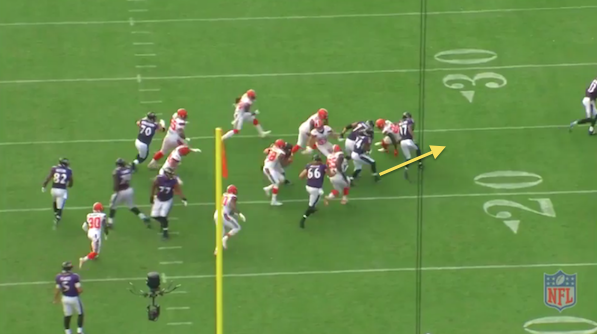Among the many Baltimore Ravens positives from last Sunday’s win over the Cleveland Browns was the pleasant surprise of running back Alex Collins in his team debut.
Called up from the practice squad on Saturday, Collins rushed for 42 yards on seven carries against Cleveland, taking advantage of a worn-down defense in the second half.

The decision to bring up Collins from the practice squad came as a bit of a surprise, as the team had called up running back Jeremy Langford – a viable replacement for Danny Woodhead – earlier in the week.
Langford, back on the Baltimore practice squad, had a short-lived tenure on the active roster, as the decision to promote Collins proved to be a shrewd move by the Ravens staff. Both Langford and Collins figure to contribute on the active roster during varying points of Woodhead’s absence, but for now, Collins is the one who has game-time experience under his belt in Baltimore.
A 2016 5th-round draft pick (171st overall) by the Seattle Seahawks, Collins rushed for a respectable 125 yards on 31 carries as a rookie, but could not stand out in a crowded backfield in year two, leading to his release. With the Ravens on Sunday, the thickly built Collins flashed his ability as a between-the-tackles runner, and proved to add another dynamic to an already talented Ravens backfield.
Let’s look at some of Collins’ carries against the Browns, and how his ability can translate to success beyond last Sunday’s game.
For a player with not much practice time in Baltimore under his belt, Collins proved to be a ball carrier with plenty of vision and patience when it came to following blocks.
Collins is far from a speed back, as he is built as a true between-the-tackles guy, however with superior decision making with the ball in his hands, he was able to bounce to the outside on a few carries.
Here, Collins patiently follows his blocks to the outside before using his lower-body balance to cut toward the middle of the field.
Collins’ quick cut allows him to go against the blocking pattern and into the open field, ultimately resulting in a 16-yard gain.
What is impressive about the run above is the ability by Collins to patiently wait for the blocks to develop, and then to coincide that patience with quick cuts in the open field.
Collins also displayed quick wits in tight spaces between the tackles.
Soon after the handoff, Collins realizes that he has little room inside, and again uses his lower-body strength to cut toward the outside. This time, though, Collins stays tight to the outside shoulder of his lead blocker, James Hurst, as he allows the play to develop.
Collins takes his time in letting Hurst execute his block, and then when the gap eventually closes, he rightfully again bounces his run to the outside, hugging the shoulder of another lead blocker.
This ultimately gives Collins an open field to work with as he works his way outside, leading to a gain.
Operating between the tackles and patiently following his blocks is what made Collins so efficient against Cleveland.
On this play, Collins again shows the ability to allow the blocks to develop as he receives the handoff.
Collins realizes that the hole quickly closes inside, forcing the quick decision to cut outside and follow his lead block.
Collins allows the block to develop, and again hugs the outside shoulder of his blocker, making himself able to bounce outside for a positive gain on the play.
For many running backs, this play would have resulted in no gain as many do not have the quick decision-making ability to bounce to the outside on one, quick cut.
Fresh off the Woodhead injury, Collins did not seem like an ideal candidate to backfill the roster spot, as his playing style is much more similar to Terrance West than Woodhead. However, the Ravens appear to be committed to a ground-and-pound running game to complement the defense in 2017, and Collins fits the bill as a powerful runner who is worthy of a handful of carries each game, when active.


















